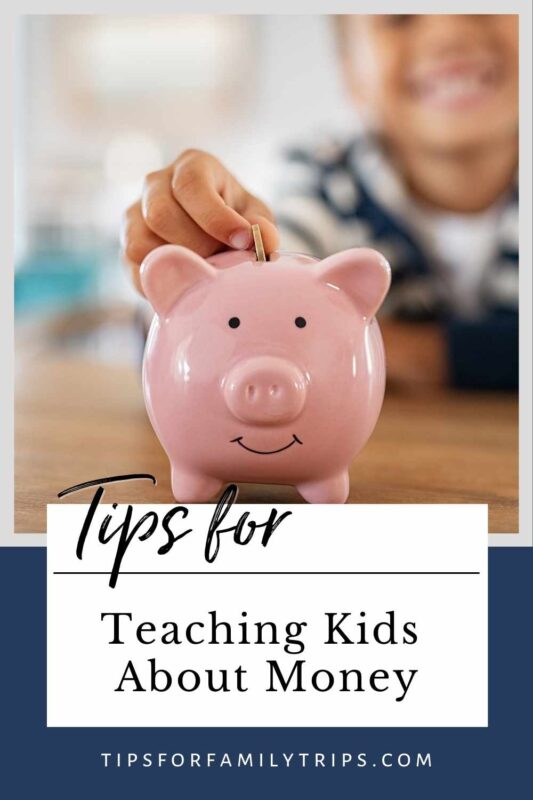Hey there! Trying to raise kids who understand money and credit – and manage money well? Me too!
Helping kids prepare for adulthood is no small task, and teaching kids about money is an important part of that preparation. For better or worse… there's a good chance that your kid's financial habits will look a lot like yours.
I have two teenagers, ages 16 and 19. One is in high school and the other is in college. My college student just returned from a semester in Europe, which was her dream. She could not have done it without learning to manage her money.
It's smart to be intentional about teaching kids about money. It's also smart to start early. Here are the strategies that have worked for my family.

What does this have to do with family trips?
Everything! Traveling with my family and saving enough money for it are my WHY and HOW for our travel lifestyle. I've found that a 2-week international dream trip for my family of four costs at least $10,000 – a large amount for most families, including mine.
My family traveled to Japan and Austria in 2023. Two dream trips in the same year was a big financial stretch for our family, but we pulled it off by:
- Saving money ON the trips – spending less on airfare, lodging, food, activities, transportation…
- Saving money FOR the trips – managing our money well enough to take two debt-free dream trips in one year
Saving money FOR your dream trip is crucial. There are lots of ways to spend less on airfare, hotel, etc., but your trip will still cost money. We save that money before the trip to avoid paying credit card interest. And we want to have enough money to splurge on the experiences that will make it a dream trip.
Travel is SO educational – in lots of ways. If you save enough money for your debt-free dream trip your kids will see what you do and know that they can do it too.
My daughter spent five months studying abroad in Austria and traveled to Hungary, Germany, Italy, Czechia, Denmark, Sweden, Slovenia, Portugal, and England while she was there. She worked hard to make that dream come true. She earned scholarships and saved her money. We helped with living expenses, but she paid for all her travel.
I believe that she was able to study abroad because we gave her a lot of travel experience AND taught her how to manage money. Now that she has solid experience with both, I'm pretty sure that she has many dream trips ahead…
Related:
Model Good Financial Habits
Kids who have good financial habits usually have parents with good financial habits. You don't need to be perfect (I'm terrible at budgeting), but if you want your kids to manage their money well, you are the BEST person to show them how.
Here are three key habits that I'm trying to teach my kids. They also make our dream trips possible:
- Pay bills on time – A long record of on-time payments is what great credit scores are made of. Great credit scores can help you get credit cards that pay YOU to travel. Thanks to credit card rewards, we haven't paid for a Southwest Airlines flight in three years!
- Pay off debts – Paying debts boosts your credit score and increases the amount of money you can save for your dream trip and other goals. Paying our credit cards in full and paying extra on our home and car loans every month saves us THOUSANDS of dollars in interest every year! That's money we can save for a dream trip.
- Save money – You'll eventually need money for your dream trip, new furniture, car repairs, clothes, Christmas, college, weddings… Save a little from every paycheck for each category. I use separate savings accounts for each and the money is there when I need it. Until then, it earns interest.
Related: 7 Ways to Get More Money for Your Dream Trip
Talk About Money
Many people don't like to share how much they earn and spend. And money creates tension in many families – there's never enough! But don't leave your kids completely in the dark. They'll understand a lot more about money if you intentionally talk about it with them and around them.
Talk to your kids about the financial habits and strategies that work well for you. Be honest about what you want to do better or what you would do differently if you could go back a few years.
Play board games like Life or Monopoly where managing money is part of winning the game. It's a good way to talk about money without talking about money.
My husband and I talk openly about what things cost, how we use credit cards, insurance, investments, what we are saving for… We ask the kids' opinions when it's about something important to them – like buying fewer Christmas gifts so we can afford to spend the holidays in Austria.

Help Young Kids Practice
Most kids can start earning, saving, and spending their own money as early as preschool. Giving young kids the chance to manage real money – and learn from mistakes – can set them up for success later.
We gave our kids a small allowance ($10 per month) when they were young. We required them to pay 10% to savings and 10% to charity. The rest was theirs to save or spend. As they got older, they had opportunities to earn money with extra household chores.
I took my kids to the bank to open their first savings account at a young age. Youth savings accounts often come with no fees, better interest rates, and other perks. Our bank adds $1 for every A on our kids' report cards.
The best time to learn from failure is when the stakes are low. Give kids enough space to make mistakes with their money. You can warn a child that it's not a good idea to spend all their money on candy two weeks before a vacation. But let them do it, and then (lovingly) let them learn from natural consequences when they can't afford the souvenir they want later.
Help Teens Practice
Teens want expensive things like phones, computers, game systems, cars, and college educations. But they are also able to earn more money. This is the time to get serious about real-world financial education because they will (hopefully) be on their own before you know it.
Bottom line: Teens should pay some of their own bills. Their financial responsibility should increase as they get older.
Every family, every family budget, and every kid is different, so your tactics may be different from ours. Here's what my husband and I do:
- We pay for school and extra-curricular expenses in high school. These are activities that boost our kids' job and social skills and we want to encourage that.
- We pay most phone and car bills because phones are necessities and it's convenient for ME when my kids drive themselves to school, work, and activities. When my kids wanted better phones than our hand-me-downs, they had to pay half and do the shopping research for their first new phone.
- We encouraged our teens when they wanted to get jobs. We didn't push them, but we didn't pay for their social lives either… My teens took different routes, but both have learned that if they want to spend money, they need to earn it first.
- We generally stopped paying for our teens' social activities, recreational shopping, and other optional personal expenses when they were old enough to earn their own money. Those expenses tend to start small and grow with their earning potential.
My teens have been easy. If they weren't we would try something else. Every kid learns differently and that's OK. But my teens have generally been happy to accept more responsibility because financial independence feels good.

Add Your Teen as an Authorized User
If you are responsible with your credit card and think that your teen is ready, add them to your account as an authorized user. There are several benefits to this strategy.
- Your teen will get practice using a credit card
- You can see everything your teen charges, set a spending limit, and set rules
- When your teen turns 18, YOUR on-time payments will boost THEIR credit score
- They can run errands for you and use your card to pay. It's convenient.
I added my teens as authorized users on my Chase Sapphire credit card around the time they got their driver's licenses. They can only use it with permission. They pay me back if they need to use credit instead of debit for personal expenses.
When my daughter started college and wanted a credit card, she had no problem getting approved because she already had a good credit score. Her card has a low limit (which is good). She pays it off when she uses it and it's one more tool in her financial toolbox. At age 19, her credit score is excellent.
Skip this strategy if you struggle to pay your credit card bill on time and keep your balance down, or if you aren't sure your teen will follow your rules. If they are an authorized user on a card that is hurting your credit score, it will hurt their credit score too. And you don't want to get stuck with the bill if your kid isn't ready to follow your rules for your card.
Related:

Conclusion
I don't usually write about parenting and money, but these topics are the WHY and HOW behind our travel lifestyle. If you want to take your dream trips and teach your kids to dream big, managing your money and teaching your kids about money is crucial.
My family's story is far from finished, but now that my teens are older, I'm excited about what they are doing and where they are heading. We've intentionally taught them about money from an early age and given them real-world practice. They are on track to financial independence and achieving their dreams. That's one of my biggest parenting goals.
I hope that our experience helps your family to take your dream trip sooner – which is educational for your kids in so many ways! Do you have a question or a great tip to share? Please use the Comments section below.
Happy travels!














Have a question or comment? Add it here.